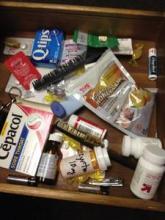I’m a pill person. I admit it.
I hate being sick and dealing with the aches and pains of everyday life. I’m the first person to hit the medicine cabinet. When I’m dealing with patients, I don’t want my own body to distract me from theirs.
So in my office, I have this drawer. My secretary calls it "the pharmacy."
As you can see, I have pretty much everything covered: Sudafed, Zyrtec, NSAIDs, an expired Celebrex packet (it’s been a few years since they detailed neurologists), and generics for Tylenol, Excedrin, and Zantac. I even have a nail clipper, ChapStick, an old albuterol metered-dose inhaler, cough drops, Q-tips, and zinc lozenges. An old hemostat that somehow ended up in there; I use it to remove tough staples. (There used to be caffeine pills, but my staff threatened to kill me if I didn’t give them up.)
Does this make me less of a doctor? I hope not. If I don’t feel good, I can’t concentrate as well on the task at hand, and in my case that’s patient care. I don’t pop pills every day, but if I need to, I do.
My staff also occasionally comes in with the seasonal viral crud, or headaches from dealing with headaches, or back pain from carrying 45 pounds of aging x-ray films back to my office. It always helps if I can keep them in shape to handle these days. They know it’s back here if they need anything.
I’m not pushing this philosophy on patients. I always mention, in any medication discussion, that I can’t make them take anything they don’t want to. (I’m also not offering them anything from the drawer – that’s my stash.) But I do emphasize that medications are, in large part, what I have to offer.
But as for me? Physician, heal thyself.
Dr. Block has a solo neurology practice in Scottsdale, Ariz.


